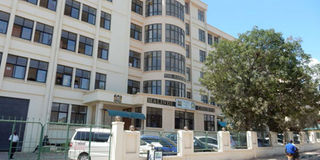Row threatens multibillion shilling Galana sugar project

Malindi Law Courts where investors took a Saudi prince to court accusing him of failing to deliver his side of the bargain in a multibillion-shilling sugar project earmarked for Galana Ranch. PHOTO | FILE | NATION MEDIA GROUP
What you need to know:
- Land for the sugar plant was to be acquired by Arafco Agricultural Integration Company Ltd, a local investor.
Firm leased 100,000 acres from the Agricultural Development Corporation and paid an initial lease of Sh2,000,000.
Upon the acquisition, the prince was to refund $300, 000 (Sh30 million) for the land.
Local investors said they opened an account at Equity Bank in anticipation of the prince’s money that never came.
A multibillion-shilling sugar project earmarked for Galana Ranch in Malindi is on the verge of collapse because of a fallout between local investors and a representative of Saudi Prince Sultan Bin Nassir Bin Abdulaziz Al-Said.
The project mooted in 2010 would have seen the prince invest more than $216 million (Sh21.6 billion) in the construction of a sugar plant on a piece of land that was to be acquired by Arafco Agricultural Integration Company Ltd, a local investor.
In the agreement entered by the company and Mr Hassan Babakar Osman, who is indicated in court papers as representing the prince, in the presence of Mr Robinson Kigen of Wesonga, Mutembei and Kigen law firm, the parties agreed to work together to establish the factory.
PRINCE'S MONEY
The company immediately leased 100,000 acres from the Agricultural Development Corporation and paid an initial lease of Sh2,000,000 on September 28, 2010.
The local investors were to get shares in the sugar company once the prince sent the agreed amount.
Upon the acquisition, the prince was to refund $300, 000 (Sh30 million) for the land.
The local investors said they opened an account at Equity Bank in anticipation of the prince’s money that never came.
According to Mr Kigen, the two parties agreed that the plant would revert to the local company if the prince failed to honour the agreement.
In 2015, the local investors took the prince’s representative to court, accusing him of failing to deliver his side of the bargain.
The lawyer said the local investors were aggrieved since they faithfully played their part.
“Mr Osman, who was acting behalf of the foreign investor, never honoured his bargain. This prompted the local investor to change the share ownership of the company. Clause Five of the 2010 agreement clearly said that if Mr Osman failed to meet his obligations, then he was to lose interest in land,” the company said.
On May 13, 2016, the Land and Environment Court in Malindi agreed with local company’s submissions.
Justice Oscar Angote said there was enough evidence showing that the local investors honoured their part in the agreement.
“Although the defendant claims to have leased the property, there is no evidence to show that he paid the rent for the initial lease, either from his personal account or from the plaintiff's. It is Mr Nuh Abdulwahab Mohamed who paid Sh2,000,000 being the initial rent and Sh438,000 being the conveying fees. The defendant's bank statement annexed on his replying affidavit does not allude to the payments that he made to ADC,” the judge said.
Mr Mohamed is one of the shareholders in the local company. The company owes ADC more than Sh14 million in arrears.
During the proceedings, Mr Osman argued that he was the one who paid for the land but the judge said he had not presented evidence to support the claim.
The court also found that there was nothing to prove that the prince or the representative had injected any money into the project.
Mr Osman appealed the ruling but it was dismissed on March 10, 2017.





